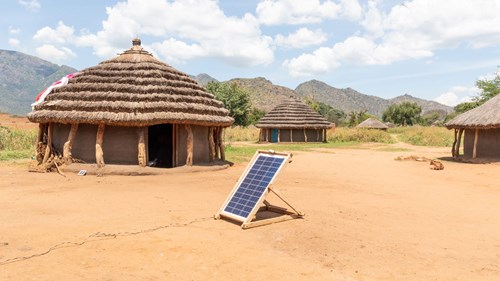Energy transition challenges show the need for fresh thinking in Africa’s power sector
Millar Cameron Partner Tim Beckh explores the challenges driving fresh thinking in Africa's power sector, and what these mean for executive search and recruitment.
Filed under: Blog Articles
Tim Beckh
Watching analysis of the latest figures for the changing energy mix in Africa during African Energy Live Data’s Review of 2020 recently, it was clear that overcoming the triple challenge of the Covid-19 pandemic, the energy transition, and attracting investment will require new and innovative solutions.
Looking at the numbers, the slowdown in the sector was stark; only 7.7GW net new installed capacity was added in all 54 African countries combined in 2020, compared with 9.6GW in 2019 and 19GW in 2018. In sub-Saharan Africa the picture was even tougher, with just 1.6GW new installed capacity added during the year, the lowest figure since 2008 and well below demand.

The slowdown reflects the impact of Covid-19, which caused delays to projects across the Continent due to travel restrictions and challenges with equipment supply. But more than that, the figures show a shift in policymaking as governments and international partners switch focus from building large, centralised power plants to smaller renewable projects, alongside greater emphasis on investing in transmission and distribution, and on the financial health of utilities. This change of focus has been reflected in the hiring decisions of Millar Cameron’s clients in the sector, demanding a different type of experience, background or mind-set.
While necessary, the evolution in focus has squeezed opportunities for the private sector, which is often limited to investing in generation on the Continent. This is pushing companies to innovate and diversify, looking at new business models, new ways of financing projects, and new types of customer.
One beneficiary is the Commercial and Industrial (C&I) power sector, which is attracting increasingly sizeable investment from private financial institutions, as well as tempting established on-grid developers such as Globeleq, which announced the acquisition of Nigerian C&I company CPGNL in January. The sector proved resilient during the pandemic. West African C&I company Starsight – backed by private equity firms Helios and African Infrastructure Investment Managers – announced record growth in 2020, ending the year with 88% more sites and 74% higher revenue.
Solar Home System (SHS) providers and financiers also continue to innovate and attract investors. Companies are adding new products to their portfolios – such as United Kingdom-based BBOXX, which said in December that it was partnering with France’s EDF and Kenya’s SunCulture to supply solar irrigation pumps to its existing customers in Togo – and at the same time financiers are creating new structures to facilitate investment into the sector. In one of the first large-scale transactions in the sector, local currency off-balance sheet financing vehicle Brighter Life Kenya 1 Ltd grew to $127m following an investment by Norfund. Brighter Life provides financing for off-grid company d.light.

(Image Credits: SunCulture)
The off-grid sector requires an ever-increasing number of entrepreneurial individuals, from in-country managers and sales staff, to software technicians, financial services professionals, development partners, and engineers. Many of these skills are transferable from other sectors or are being home-grown, with businesses hiring competency, quality and attitude rather than a long history in the power sector. This is good for the Continent as these new ventures upskill local resources, draw talent back from the diaspora and seek high quality individuals from African universities.
State-owned utilities are having to face up to the challenges posed by off-grid. This is delaying moves to allow private power plants to sell directly to customers or distributors over the grid, with governments fearing the consequences for cash-strapped utilities. Some governments and regulators have moved to protect utilities by more heavily regulating off-grid power. But other utilities are looking at moving into the space themselves; Kenya’s distribution utility Kenya Power and Lighting Company began tendering earlier this year for solar power developers who might finance, build and operate captive power plants at the premises of some of its customers. Umeme in Uganda has been exploring innovative partnerships with off-grid and SHS businesses to grow energy access through less traditional supply structures. As a response, utilities are having to consider their own people mix and whether they have the entrepreneurial and innovative thinking in-house to be able to engage with these new models and technologies.
The need to attract private investment and to respond to climate change, as well as the impact of new technologies and business models have important ramifications for governments and utilities, which are having to upskill fast. New possibilities for private sector-led off-grid development mean that least cost electrification plans have emerged as an important tool for policy making. These help policymakers understand the costs and benefits of different electrification approaches – household systems, mini-grids, or grid extension – and are built from careful geospatial analysis.
Utilities in many countries are starting to grapple with increasing quantities of variable renewable power, adding new skills and technology to help improve forecasting and manage intermittency. After gas and hydropower, solar and wind saw the most capacity added on the Continent in 2020 according to African Energy Live Data. This poses an interesting challenge for engineers often accustomed to working with established technologies like hydropower, coal, gas and diesel.
In many countries it has also raised a heated debate about the future of the energy mix. Is baseload power still relevant? How much thermal or hydropower is needed compared with battery storage? Governments and utilities are beefing up their own analytical capabilities and will also need to draw on international expertise and experiences in the coming years to answer these questions. Effective least-cost modelling is more and more of a must for governments.
Alongside changes to the energy mix, most African countries are looking to increase private investment into the power sector. This requires politically challenging reforms, often including tariff increases, but also new skills and capacity. Financial modelling, tax expertise, and legal knowledge are essential if governments and utilities are going to negotiate effectively with private counterparties.
These technological, environmental, and policy imperatives mean that now more than ever skilled and innovative leaders and staff are at the heart of making the energy sector work. Creative and dynamic people are needed in the private sector to drive technological, commercial and operational change and investment, in the regulators managing dynamic sectors, and in governments trying to deliver development objectives in a rapidly changing environment.
So from the perspective of an executive recruiter working with African and international investors, developers and operators, far from being a mature, stable industry, the African power sector is as vibrant, diverse and exciting as ever. It is demanding fresh thinking and ideas, new approaches and greater agility, seasoned leadership as well as raw talent. There is an awfully long way to go to provide reliable, affordable and productive power to all those who need it and along the way the opportunity to provide meaningful and rewarding employment for hundreds of thousands of Africans.
Tim Beckh is a Partner in the Power & Infrastructure of Millar Cameron, a leading executive and senior management recruitment business operating exclusively in Africa and emerging markets. For more about Millar Cameron visit our website at www.millarcameron.com or speak to one of our team.




